Results
-
 £147.10
£147.10 -
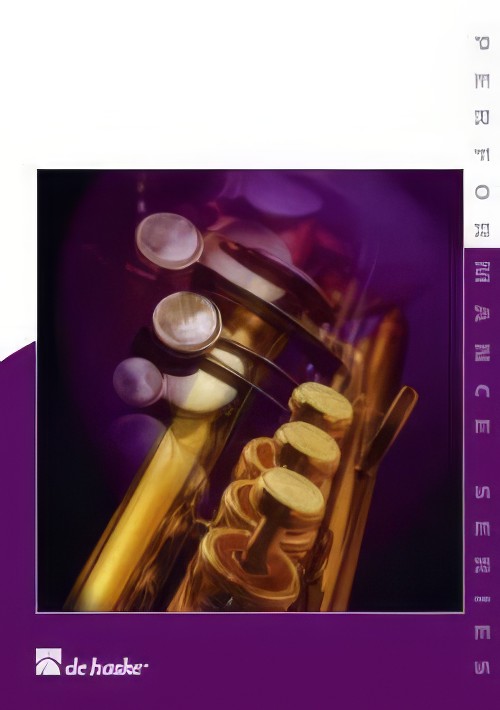 £72.99
£72.99Postcard from Greece (Concert Band - Score and Parts) - De Haan, Jacob
This short piece reflects the atmosphere of Greece in its entire splendour. White houses against a clear blue sky near the sea, sandy beaches, tiny streets and arches in lovely fishing villages, typical Greek food like moussaka, along with the Greek folk dances such as the Sirtaki. Take your audience to a balmy summer evening on a Greek island with this colourful new work.Duration: 2:00
Estimated dispatch 7-14 working days
-
 £84.99
£84.99Mykonos (Concert Band - Score and Parts)
Mykonos is one of the most popular of the Cyclades islands in the Aegean. The most important town is that of Mykonos, a harbour on the west coast. The most important source of income for the island is tourism. The magnificent landscape, in which white and blue dominate in the dazzling light, is the great attraction of the island. Apart from this, there are also many churches, chapels, windmills and a couple of museums--Mykonos is a truly ideal holiday destination.The Belgian wind band composer Johan Nijs captures impressions of the island's atmosphere in Mykonos. The work is written in a typically Greek style: two sirtakis are employed and the piece closes with a characteristic Greek presto. Greek sounds are also incorporated into the slower passages. 05:40
Estimated dispatch 7-14 working days
-
 £84.99
£84.99Mykonos - Johan Nijs
Mykonos is one of the most popular of the Cyclades islands in the Aegean. The most important town is that of Mykonos, a harbour on the west coast. The most important source of income for the island is tourism. The magnificent landscape, in which white and blue dominate in the dazzling light, is the great attraction of the island. Apart from this, there are also many churches, chapels, windmills and a couple of museums--Mykonos is a truly ideal holiday destination.The Belgian wind band composer Johan Nijs captures impressions of the island's atmosphere in Mykonos. The work is written in a typically Greek style: two sirtakis are employed and the piece closes with acharacteristic Greek presto. Greek sounds are also incorporated into the slower passages.
Estimated dispatch 7-14 working days
-
£184.99
Rubicon - Bert Appermont
The Rubicon is a river in Northern Italy which Julius Caesar crossed with his army in 49 BC in defiance of the leaders of Rome, who feared his power. A civil war against rival Pompey ensued, which culminated in Caesar seizing power as the absoluteruler of Rome. The phrase "crossing the Rubicon" therefore refers to any person committing himself irrevocably to a risky, decisive and irrevocable of course of action.The work consists of three parts that deal with this important moment in history.Part 1 (Meditation) symbolises Caesars request to the Gods to assist him in his difficult choice. In a slow introduction we hear the melancholy and beseeching sounds of the duduk (alternatively, this part can be played by a soprano saxophone)and of the soprano solo singer over the bourdon accompaniment. The soprano solo singer then sings "dona tibi pacem" (give him rest) in a melodious and probing theme.In Part 2 (Battle of Pharsalus) trumpets and trombones resound alternately ina stately Roman fanfare, producing a stereophonic effect. This develops into a martial theme in which Caesars impressive army goes to battle against the army of rival Pompey. While the theme of Caesars army fades away, Pompeys theme emerges as anaive dance in six-eight time. His army is definitely in the majority and it believes it can easily defeat the enemy. Suddenly trumpets and trombones clash on two sides of the orchestra: Caesars army advances and attacks. A fierce battle ensues inwhich the two themes are played alternately as well as simultaneously. Thanks to his shrewd battle tactics, Caesar manages to win this legendary battle after all: his theme resounds ever louder in trumpets and horns until everything dies out andchanges into a kind of reconciliation between the soldiers of the two armies. The melancholy "dona tibi pacem" from part 1 now serves as a reconciliation theme.Caesar is now the sole ruler of the New Roman Empire, which would be destined to leave itsmark on our Western civilisation to this day. The third part is a sparkling succession of dance music (Dance) with many Greek and Roman elements in which Caesars victory is praised and celebrated. It is common knowledge that the culture(arts, gods, etc.) of the Romans drew heavily on Greek culture. I have therefore used an authentic Greek theme (the Seikolos song) several times in this part (bar 17 in the euphonium, bar 60 in the base section, bar 68 in the sopranosaxophone) to suggest the music of that era and to evoke the right atmosphere. After a gradual increase in tempo in the entire orchestra, the opening melody gloriously resounds once more, surrounded by virtuoso dance music. The work ends withbombastic brass fanfares in which Caesars theme triumphs once more.NOTE FOR THE CONDUCTOR:The Armenian duduk and the monochord that are used in the introduction give a special tone to the music, but could be substituted (soprano saxophone instead ofthe duduk) or left out (monochord). The soprano solo is also doubled within the orchestra and could therefore also be left out if necessary, although it does provide the work with an extra dimension. The male voices in the introduction and the finalecould possibly be replaced with a synthesizer with choral setting.As a visual and acoustic element in part 2, the trumpets, the e-flat cornet, the small drum and trombones can be stood up and placed at two sides of the orchestra (bar 80).Seen fromthe point of view of the conductor, put the trumpets, the e-flat cornet and the small drum in the left section and the trombones in the right section of the orchestra. This also helps to create a visual contrast between the two themes of the secondpart. The players can be seated again at bar 97 or bar 121. The soprano soloist can be placed in or in front of the orchestra, depending on what gives the best result. For the conclusion of the work the soprano solo can be sung from afar (from thewings) to create additional atmosphere.This work was composed especially for the "St Joseph" brass band from Pey/Echt (Belgium) with conductor Mark Prils.
Estimated dispatch 7-14 working days
-
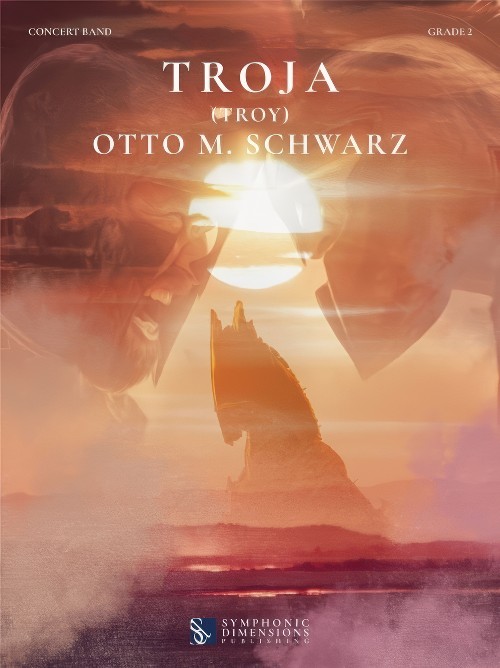 £79.99
£79.99Troja (Troy) (Concert Band - Score and Parts) - Schwarz, Otto M.
The Greek poet Homer wrote about Troy and the Trojan War, which probably took place in what is now Asia Minor, in his Iliad in the 8th century B.C. Nowadays, the term Trojan generally refers to a malware program that is used to gain unauthorised access to computers. This use comes from the legendary Trojan Horse, which saw the turning point in the battle between Greeks and Trojans through the cunning of Odysseus. Let us return to the beginning of the story: Paris, son of the king of Troy, is tasked by Zeus with judging the beauty of the three goddesses Aphrodite, Pallas Athena, and Hera. Aphrodite, the goddess of love, flatters Paris by promising him the most beautiful woman in the world. Soon afterwards, on a journey to Greece, Paris meets the beautiful Helen, who immediately falls in love with him. Since however she is the wife of Spartan king Menelaus, she eventually lets herself be kidnapped by Paris voluntarily. The Greeks then form a large army and go to war against Troy to retrieve Helen, leading to a ten-year siege of the city. The city is eventually conquered not through combat, however, but through Odysseus' cunning ploy. He has the idea of building an enormous wooden horse with warriors hidden inside. The horse is placed at the gates of the city. Thus, the Trojans are tricked into giving up the siege when, despite various warnings, they bring the horse into the city to dedicate it to the goddess Athena. At night, the soldiers climb out of the horse and open the gate for the Greek army. The troops storm the city and burn it to the ground. The royal family and all the Trojan warriors are killed, only Aeneas, the son of Aphrodite, escapes. Later, following many years' wanderings he and his acolytes will become known as the founders of the Roman people. There are various accounts of the fate of the beautiful Helen. She is said to have returned to Sparta with Menelaus and to have ruled there until the end of her life. Or maybe not...Duration: 6.00
Estimated dispatch 7-14 working days
-
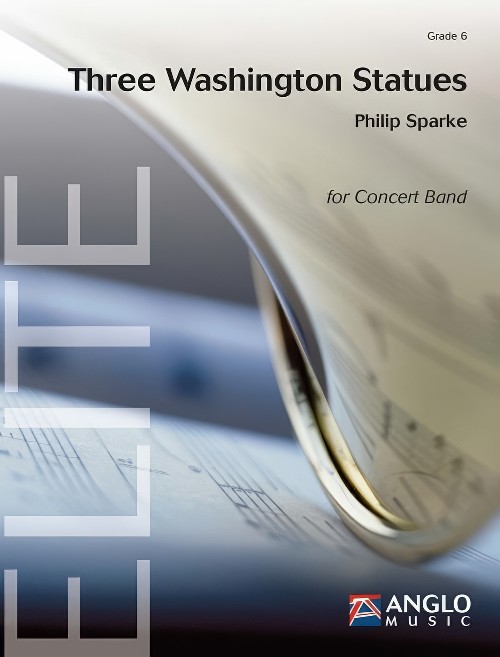 £164.99
£164.99Three Washington Statues (Concert Band - Score and Parts) - Sparke, Philip
Three Washington Statues was commissioned by the United States Army Band "Pershing's Own", led by Colonel Thomas H. Palmatier. Washington D.C. contains some of the world's most iconic monuments, memorials and statues. Philip Sparke has chosen three of these as the inspiration for this piece: 'The Lincoln Memorial' in the form of a Greek Doric temple in which the composer depicts the grandeur of this monument; 'The Martin Luther King, Jr. Memorial' on which steps the iconic speech 'I have a dream' was given - the music is both reverential as well as powerful referring to Martin Luther Kings' speech; and the 'Encore' statue in memory of the world famous African-American composer, pianist and bandleader Duke Ellington. In this final movement, Philip Sparke catches the virtuosic, energetic and unique dynamism of Ellington's' music. Three Washington Statues was commissioned by the United States Army Band "Pershing's Own", led by Colonel Thomas H. Palmatier. Washington D.C. contains some of the world's most iconic monuments, memorials and statues. Philip Sparke has chosen three of these as the inspiration for this piece: 'The Lincoln Memorial' in the form of a Greek Doric temple in which the composer depicts the grandeur of this monument; 'The Martin Luther King, Jr. Memorial' on which steps the iconic speech 'I have a dream' was given - the music is both reverential as well as powerful referring to Martin Luther Kings' speech; and the 'Encore' statue in memory of the world famous African-American composer, pianist and bandleader Duke Ellington. In this final movement, Philip Sparke catches the virtuosic, energetic and unique dynamism of Ellington's' music.Duration: 8:45
Estimated dispatch 7-14 working days
-
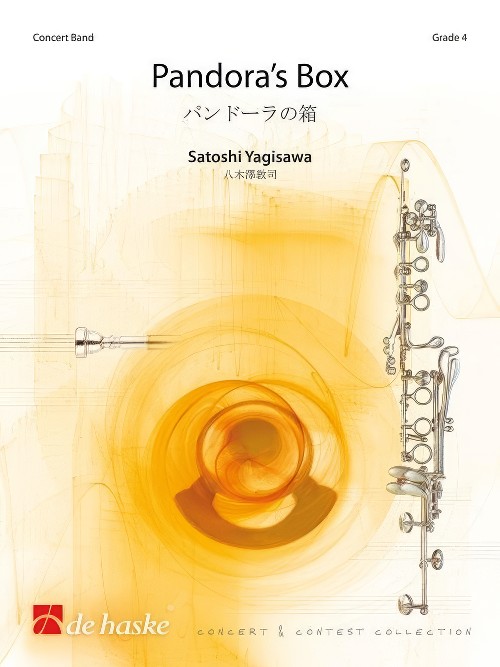 £149.99
£149.99Pandora's Box (Concert Band - Score and Parts) - Yagisawa, Satoshi
Pandora appears in Greek mythology - the first woman, created by the gods and sent to earth as an evil addition to the human race. 'Pan' means 'all' and 'dora' means 'gifted'. Pandora's Box must by no means be opened. The various stories surrounding this box inspired Yagisawa to write this dramatic piece, an addition to his series of pieces based on Greek mythology, such as Perseus.Duration: 9:00
Estimated dispatch 7-14 working days
-
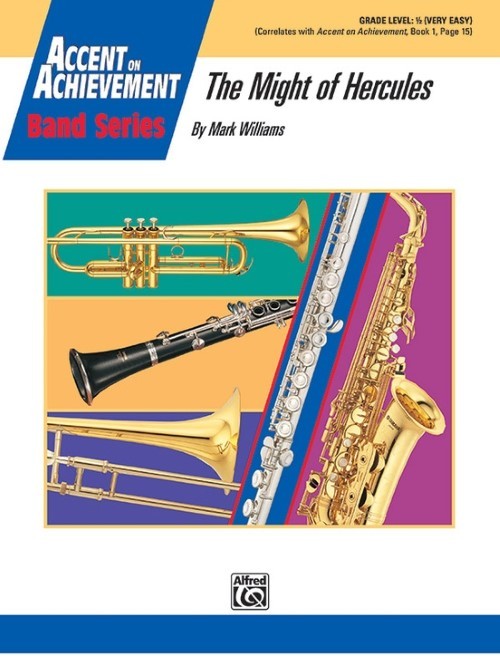 £48.95
£48.95The Might of Hercules (Concert Band - Score and Parts) - Williams, Mark
The legendary strength of this great hero of Greek mythology is reflected in this powerful new work for first-year band. Written in the Greek modes of Phrygian and Aeolian, this impressive work combines active, driving percussion and very easy wind parts in quarter notes to produce a perfect sonic showpiece for your beginning band. Correlated with Accent on Achievement, Book 1, page 15, this is destined to be an all-time student and audience favourite. Duration: 1.45
Estimated dispatch 7-14 working days
-
 £317.99
£317.99Music of the Spheres (Concert Band - Score and Parts) - Sparke, Philip
The piece reflects the composer's fascination with the origins of the universe and deep space in general. The title comes from a theory, formulated by Pythagoras, that the cosmos was ruled by the same laws he had discovered that govern the ratios of note frequencies of the musical scale. ('Harmonia' in Ancient Greek, which means scale or tuning rather than harmony - Greek music was monophonic). He also believed that these ratios corresponded to the distances of the six known planets from the sun and that the planets each produced a musical note which combined to weave a continuous heavenly melody (which, unfortunately, we humans cannot hear). In this work, these six notes form the basis of the sections MUSIC OF THE SPHERES and HARMONIA. The pieces opens with a horn solo called t = 0, a name given by some scientists to the moment of the Big Bang when time and space were created, and this is followed by a depiction of the BIG BANG itself, as the entire universe bursts out from a single point. A slower section follows called THE LONELY PLANET which is a meditation on the incredible and unlikely set of circumstances which led to the creation of the Earth as a planet that can support life, and the constant search for other civilisations elsewhere in the universe. ASTEROIDS AND SHOOTING STARS depicts both the benign and dangerous objects that are flying through space and which constantly threaten our planet, and the piece ends with THE UNKNOWN, leaving in question whether our continually expanding exploration of the universe will eventually lead to enlightenment or destruction.Duration: 15:30
Estimated dispatch 7-14 working days
